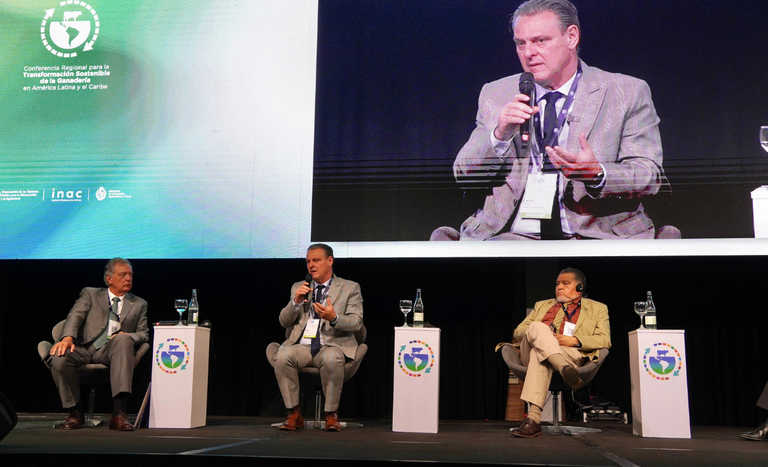Notícias
FOREIGN RELATIONS
Minister Fávaro attends 1st Regional Conference on Sustainable Livestock Transformation in Latin America and the Caribbean

Minister Fávaro attends 1st Regional Conference on Sustainable Livestock Transformation in Latin America and the Caribbean
On Wednesday, Brazilian Minister of Agriculture and Livestock, Carlos Fávaro, took part in the First Regional Conference for Sustainable Livestock Transformation in Punta del Este, Uruguay. The event aimed to foster more innovative, resilient, and efficient production systems that reduce environmental impact and improve access to nutritious food.
During the ministerial panel titled "Political Framework for the Sustainable Transformation of Livestock," Fávaro was joined by Peru’s Agriculture Minister, Ángel Manero; Mexico’s Julio Berdegué; and Guatemala’s Maynor Estrada. The discussion, moderated by Uruguay’s Minister of Livestock, Agriculture, and Fisheries, Fernando Mattos, focused on the challenges of promoting sustainable livestock production and the role of public policies and international agreements in this process.
Minister Fávaro emphasized the vital role of Brazilian farmers and public policies that support sustainable practices. “In the months under President Lula’s administration, Brazil has established forward-thinking policies. A study by Embrapa found that 40 million out of 160 million hectares of Brazilian pastures are degraded but have high productive potential and need restoration. That’s why we launched a program offering BRL 7 billion in credit lines for ranchers to rehabilitate these areas using fertilizers, organic matter, new seeds, and technology, with a 7% annual interest rate, a two-year grace period, and 10 years for repayment,” Fávaro explained.
The National Program for the Conversion of Degraded Pastures aims to restore 40 million hectares, enhancing land productivity, reinforcing food security, and contributing to environmental conservation.
Fávaro also highlighted Brazil’s capacity for carbon sequestration and its contribution to mitigating global warming. “Well-managed pastures with robust foliage are extremely efficient at sequestering carbon through photosynthesis. The larger the leaf area, the more carbon is captured. This is a straightforward and highly sustainable solution, but it requires investment and dedication, which we are promoting,” he said.
Fernando Mattos highlighted Brazil’s role as a strategic partner, citing the country’s significant agricultural progress over recent decades. “I recently met Minister Fávaro at the G20 Agricultural Working Group event in Mato Grosso. Over the past 40 years, Brazil has undergone a major green revolution, transforming from a meat importer to a leading global exporter. Investments in research and sustainability have positioned Brazil at the forefront of global agricultural discussions,” Mattos noted, emphasizing the importance of respecting the sovereignty of Latin American and Caribbean producers.
Fávaro also referred to a letter Brazil sent to the European Union, requesting the suspension of the Anti-Deforestation Law and a review of its punitive approach. “I am urging the European Commissioner for Agriculture to take immediate action to suspend the legislation passed by the European Parliament, which restricts the purchase of products linked to deforestation and is set to take effect in January 2025. We are not opposing the discussion of this issue or shirking responsibility for sustainable production. The problem lies in the unilateral decision made without dialogue, which disregards the sovereignty of producer countries. It is essential to engage with partner nations, both sellers and buyers, to discuss sustainable production practices,” Fávaro said, expressing appreciation for the support of other South American countries for Brazil’s stance.
EXTRAORDINARY MEETING WITH IICA
Minister Fávaro also took part in a side meeting with the Inter-American Institute for Cooperation on Agriculture (IICA), attended by representatives from 27 countries across South America, Latin America, the Caribbean, and North America. The meeting led to the drafting of a letter to be presented to the European Community, underscoring how the EU's deforestation law impedes diplomatic and trade relations between Europe and the Americas.
ABOUT THE REGIONAL CONFERENCE
The conference was organized by the FAO, Uruguay’s Ministry of Livestock, Agriculture, and Fisheries, and Uruguay’s National Meat Institute. Its main objectives included raising awareness about sustainable livestock practices within the FAO’s 2022-2031 Strategic Framework and the Sustainable Development Goals (SDGs) and fostering the exchange of knowledge and successful innovations in livestock management.
The event facilitated discussions on policies that balance economic viability with environmental responsibility, bringing together leaders and experts from across the region to explore solutions that align economic growth with environmental preservation and social well-being in the agricultural sector.
Press information
imprensa@agro.gov.br